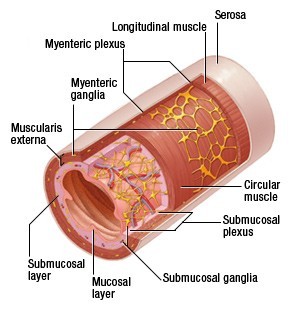by Diana Khoury
Scientists have recently identified a “second brain” in the body, known as the enteric nervous system. The enteric nervous system is a large collection of neurons located in the walls of the digestive tract, along the alimentary canal spanning from the esophagus to the anus. It is estimated that the “gut brain” contains anywhere from 200-600 million nerve cells1, significantly more than are found in either the spinal cord or the peripheral nervous system. The enteric nervous system, part of the autonomic (involuntary) nervous system, operates independently of, yet sends signals directly to, the central nervous system to regulate and communicate the status of gastrointestinal functions.
In response to the discovery of the “gut brain”, neuro- gastroenterology has emerged as a new field of scientific research. Leading scientists at Columbia University and UCLA describe the enteric nervous system as complex and responsible for many important bodily functions beyond that of merely digestion.
The enteric nervous system controls local functions of the 
Dysfunction of the enteric nervous system correlates with digestive as well as neurological disorders.2 Since 95% of the body’s serotonin is produced and stored in the digestive tract, gastrointestinal imbalance is often accompanied by mood disorders such as depression. This gut-brain connection may explain why antidepressants are commonly prescribed to address digestive disorders3. Alternately, some research suggests that antidepressants cause digestive disorders because they elevate serotonin levels2. Currently pharmaceutical companies are providing most of the funding for neurogastroenterology research because they see a large market opportunity in the potential findings.
Neurogastroenterology research has found a direct relationship between the body’s nervous and digestive systems. Therefore it is essential that a treatment plan addresses the nervous system in order to effectively treat digestive issues. Pharmaceuticals prescribed to treat the symptoms of gastrointestinal or mood disorders often have side effects, and are not the only treatment option. Research validates the efficacy of acupuncture5 and therapeutic massage6 as alternate approaches to balancing the nervous system and restoring proper digestive function. The objective of a treatment plan is to reduce or eliminate symptoms, restore the integrity of the gastrointestinal tract, and relieve stress in the nervous system to encourage greater body-mind health.
This is an original article from Dreamclinic, Inc. Dreamclinic is a Health and Wellness company committed to sharing information about commonly experienced health conditions and how they may be impacted through the use of bodywork and other natural approaches. Dreamclinic offers massage, acupuncture, and Reiki sessions at its Greenlake and Queen Anne clinics, as well as onsite massage at workplaces around Puget Sound. Contact us to learn more about how Dreamclinic can help you, your family or your workplace experience greater health.
References:
1. http://www.scholarpedia.org/article/Enteric_nervous_system#Regulation_of_gastrointestinal_endocrine_cells
2. http://www.scientificamerican.com/article/gut-second-brain/
3. http://www.touchpoint.dk/xdoc/wss/74/docs/285/Your_Gut_is_Wiser_than_You_Think.pdf
4. http://www.nature.com/nrgastro/collection/enteric/index.html
5. http://cim.ucsd.edu/clinical-care/acupuncture.shtml
6. http://www.hopkinsmedicine.org/integrative_medicine_digestive_center/services/therapeutic_massage.html
Image: http://www.mayo.edu/research/discoverys-edge/ibd-exploring-role-neurons-gut-motility
Other Resources:
http://www.utexas.edu/research/asrec/neuron.html
http://www.cumc.columbia.edu/dept/gsas/anatomy/Faculty/Gershon/
